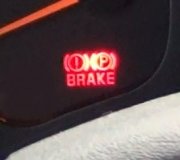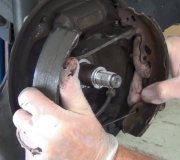I thought we were past this. Why are you bringing it up again?
I don't have to crash into a wall on the race track to know it's going to hurt, but that doesn't disqualify me from warning others about it.
I don't have to stick my hand into a spinning radiator fan to be qualified to warn others about what happened to someone else.
I certainly would never own a Ford front-wheel-drive car after seeing the huge number of steering and suspension part failures, but I'm still going to warn my friends.
The fact is I base MY buying decisions on past experience, and much of that past experience comes from what I've worked on. In the '80s Volkswagen was too cheap to make both tie rod ends adjustable so you could center the steering wheel during an alignment. All you got was one adjuster for total toe, then you had to remove the steering wheel and hope when you reinstalled it, one of the splines would bring it close to centered. When installing aftermarket radios or cruise control, I was real impressed to see a flimsy, crumbling cardboard panel holding up the loose wiring under the dash. The quality I'm sure has improved since then, but the fact remains my first impressions are lasting impressions. As with all other consumers, it is going to take a lot to change that.
My experience, which you put a premium on, has been that the mentality of the manufacturers doesn't change much over the decades. GM has always had extremely high-pressure salespeople, and they find all the loopholes when it comes to fixing their products under warranty. They are also the best at finding ways to get owners to spend a lot more money on repairs than any other manufacturer. I don't have to own one to know that. That hasn't changed since the first time I walked into one of their showrooms in 1976.
Ford has had design problems with their ball joints and tie rod ends since the '70s. Once enough people have been affected, they come out with advertising bragging about their "new, redesigned steering systems" thinking that will put buyers' minds at ease. I don't see that changing either.
Now you say Volkswagen couldn't be bothered to install a pressure-differential valve and switch to warn owners of a brake problem? Amazing. And how do you defend that? I would never have believed that since I've never seen that on any other car brand, but if it's true, who is VW looking out for?
For two years in the mid '90s Jeep had a driver's air bag system that used absolutely no electronics, no crash sensors, no computers, and was infinitely more safe to handle by inexperienced do-it-yourselfers, but the dimwit politicians weren't happy because there was no warning light to monitor it. Instead we now have computer controls, sensors that can have unknown arced spots that prevent future operation yet they test good. We have clock springs that fall apart. We have air bags that can be set off from static electricity when people monkey with the safeguards or try to perform electrical checks. With our uninformed politicians sticking their ignorant noses into a safe and reliable air bag system, how is it they haven't attacked VW for their lack of the same warning system every other manufacturer has been using since the '60s? Do the engineers at Volkswagen know something no one else has figured out?
I'm very happy to have you on-board as a VW expert, and I like reading your replies, but you're being very short-sighted in one important regard when you say I should stick with what I have experience on. All good instructors, and all intelligent employers understand no one can teach or be taught every little detail about every car model every year. We leave that to doctors who only have to learn two models in varying sizes for their entire careers. A smart mechanic is the one who takes his training and experience, and can apply it to new situations. That's why I don't have to skid into the wall at the race track. I can apply what I learned from watching other people do that. The same is true when listening to the experiences of other instructors and car owners. I have no reason to doubt what they tell me, especially when they show me their repair bills.
One of the minimum qualifications for teaching in the Wisconsin Technical College System is you must have done it for at least seven years. That means you worked on cars or trucks, not that you worked on Volkswagens, or you worked on Chryslers. Even the administrators know no one has experience on all car brands, all car models from all years, or even all the systems and specialty areas of one car model, yet they expect you to teach those things. That's what I enjoy doing here. Teaching how a circuit works and is diagnosed is more time-consuming but more effective than just typing a one or two-sentence answer to a problem. Even if I had never done brake work on a Volkswagen, that does not disqualify me from teaching about brake systems in general. Likewise, if you're like most other mechanics, you specialize in a few certain areas, but that doesn't mean you can't transfer that knowledge to other car brands. If you think your lack of experience on other brands precludes you from working on them, or even being knowledgeable about them, THAT is what I mean by being short-sighted.
You are just as qualified as I am to teach, and if you think your lack of experience on other car brands will make you an ineffective instructor, welcome to our world. We all start out thinking that way, but unlike you and most other mechanics, we grow out of it as we get more and more continuing training, and when we finally realize we are never going to have all the answers. We are the students' advocate in their learning, and we're a guide, not a fact dispenser. Every year all automotive instructors in the state attend hour-long update classes put on by auto and parts manufacturers' representatives. Chrysler is always there. GM, Honda, and Toyota show up sometimes. Ford has usually been there. Every manufacturer is invited. VW, Audi, and certainly BMW have never been there. BMW in particular does not share anything, from paint codes to service information. Apparently they think that is in their customers' best interest to prevent independent shops from working on their products.
You would also be surprised at how many problems we get answered by those instructors from other manufacturers. They know a whole lot about their competitors' products and business practices, both the good and bad points, and they are perfectly qualified to discuss them even though they don't have the first-hand experience that you think is required. My experience with all of them has been that they never berate or ridicule the competition, and if I were to make a derogatory remark, they would take the time to explain that manufacturer's reasons behind their actions, in a positive manner. I may not like what a manufacturer did, but at least I understand why they did it. I DO put a negative spin on it when it puts the company's interests ahead of their customers'. That's where GM falls flat and Hyundai, Toyota, and Chrysler excel. (Those are not my words, and that refers to their business practices, not the quality of their products).
Much of my information comes from a former student who works for the local VW dealership. He proved his worth over two years, then his boss invested in him by sending him to our two-year program. During that time he is the one who brought up stories of locked-up computers, cars that would not come out of park or come off idle, and cars sent there by other shops because their aftermarket scanners wouldn't work on them. If those stories he shared have even the slightest chance of being true, I owe it to people to err on the side of caution and warn them of the possibility. Can you imagine how I would feel if I didn't say anything, then someone ran into a problem that my comment could have avoided? This kid also attended those high-level classes I mentioned earlier, and very often during the breaks we listened to him and the instructor discussing the same things related to VWs. The fact that your experiences have been more positive is wonderful, but don't pass judgement on everyone else's experiences until we know why they were different.
You mentioned "Loss of ABS Module Communication is common for that vehicle". I have no reason to doubt that either, however, what is the likelihood that is the cause of this problem one hour after doing normal brake work? Logic dictates to look for something related to that brake job first, and that is what I covered in my very first reply that you took issue with. On all other car brands only the yellow ABS light will turn on when there's a problem with the ABS system. Since Volkswagen does a lot of things differently than everyone else, I suppose it is possible they turn both lights on to add to the confusion, but normally the red light only turns on for a fluid-related problem in the base brake system, not a problem in the ABS system. Based on that, my original reply is correct. There are three things that might be the cause. If indeed the car does not have a pressure-differential valve, the owner would have to have found the cause of the red light being on before he got to that point so it's useless to argue over it.
In your last comment you stated, "'96 Jetta non-ABS on the hoist today. Low brake pedal and no warning light on in dash.
No pressure differential switch anywhere in sight ( at master cylinder or elsewhere ). Level sensor tested faulty, so that is why the brake warning light is not on with low level".
I can understand a faulty level sensor but what does that have to do with the low pedal? If there's an external leak, are we to understand the engineers want you to pump enough brake fluid onto the ground, and run a few stop signs, until the level finally gets low enough to turn the light on? How many people will be driving around with only half of their braking system and not realize it? What if there's an internal leak in the master cylinder and the fluid level never goes down? On GM front-wheel-drive cars, applying the brakes when there's a leak in half of the system causes a valve to trip and block additional fluid flow to that leak. The level will not go down, and the brake pedal will feel normal. The only clues to the problem are a slight twitch in the steering wheel when the brakes are applied, ... And the red warning light. Chrysler doesn't block the fluid flow but they have scrub radius so well perfected that even that tiny twitch in the steering wheel is gone. Many drivers don't recognize a brake pedal that's lower than normal. They need to be told as soon as possible before they DO get into a situation that requires the best possible stopping power. Seems to me if VW doesn't care to do that, they are not concerned with lawsuits and liability issues.
So what was the cause of the low brake pedal, and what was the cause of the low fluid? Where the two related?
Saturday, March 2nd, 2013 AT 3:53 AM



